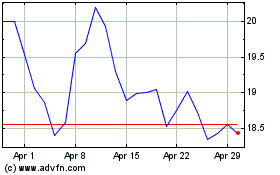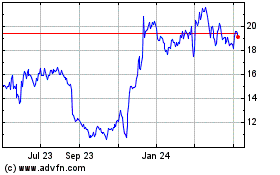Chain lowers profit outlook as retailers kick off earnings
season; shares fall 13%
By Suzanne Kapner and Aisha Al-Muslim
This article is being republished as part of our daily
reproduction of WSJ.com articles that also appeared in the U.S.
print edition of The Wall Street Journal (August 15, 2019).
Macy's Inc. lowered its full-year earnings outlook after missing
profit expectations in the latest quarter, as department stores
continue to lose shoppers to newer forms of retailing.
In a troubling sign heading into the key back-to-school and
holiday seasons, the department-store chain said inventories of
unsold items swelled in the summer quarter. At the same time, the
company and its rivals face the prospect of tariffs on some Chinese
apparel imports starting next month.
Sales at stores open at least a year rose 0.2% in the three
months ended Aug. 3. Including licensed departments, the measure
grew 0.3%. But net income nearly halved to $86 million from $166
million a year earlier on lower asset sales and higher merchandise
markdowns.
The results sent Macy's shares tumbling, and darkened the
outlook for the broader retail sector as it kicks off its earnings
season. Macy's stock fell 13% to $16.80 on Wednesday. Shares are
down about 58% in the past 12 months.
Thursday brings more insight into the industry, with quarterly
results expected from the largest U.S. retailer, Walmart Inc., and
government data on retail sales for the month of July.
Macy's Chief Executive Jeff Gennette said consumer spending
remained healthy, but Macy's wasn't gaining market share in a sea
of tough competition, although it had started to narrow the
gap.
"The customer has more choices than ever," Mr. Gennette said in
an interview Wednesday. "There are new formats emerging every
single day. Brands have their own retail stores and digital
channels. Off-price retailers continue to gain share."
Mr. Gennette has succeeded in reversing several years of
same-store sales declines, creating hope for a broader turnaround
in the business.
But this year got off to a slow start, Mr. Gennette told
analysts on a conference call, leaving Macy's with too much
inventory. That necessitated bigger-than-expected markdowns to
clear unsold goods, which hurt profits, he said, adding that the
company entered the current quarter with the right inventory
mix.
The retailer's second-quarter results weighed on rivals, which
are set to report their latest results in coming days. Shares of
Nordstrom Inc. and Kohl's Corp. fell nearly 11% Wednesday, while
J.C. Penney Co.'s stock was down 4.9% amid a broader market
selloff. Investors and analysts will be looking for any broader
signs of a consumer slowdown when those companies report, beginning
with J.C. Penney on Thursday.
Macy's and other chains have been closing weaker stores in
recent years and spending to expand their e-commerce efforts. The
companies are struggling to capture shoppers despite strong
consumer spending and low U.S. unemployment.
High-end department store chain Barneys New York Inc. recently
filed for chapter 11 bankruptcy protection, with plans to close 15
of its 22 stores. Meanwhile, the owner of Sears and Kmart, which
filed for bankruptcy last fall, said this month it is closing
another two dozen locations. And J.C. Penney said last week that it
was at risk of being delisted from the New York Stock Exchange
because its shares hadn't maintained an average closing price of at
least $1 for 30 consecutive days.
Nordstrom is under fire, too, with some directors pushing to
bring in an outsider as CEO as the company's financial performance
has deteriorated in recent months.
Macy's has been experimenting with new concepts to draw shoppers
to its stores. Mr. Gennette said on Wednesday that the chain was
joining with resale marketplace ThredUp Inc. to sell used clothing
and accessories in 40 Macy's stores. Its Bloomingdale's chain
recently unveiled plans to launch a rental service called My
List.
For the current fiscal year that ends in early 2020, Macy's
lowered its earnings guidance by 20 cents. Excluding settlement
charges, and impairment and other costs, the company now forecasts
adjusted earnings per share of $2.85 to $3.05 for the year,
compared with its previous estimate of $3.05 to $3.25.
Macy's reaffirmed its annual sales guidance. The company still
expects net sales to be roughly flat from the last fiscal year,
with comparable sales to be flat to up 1%. In the recently
completed period, net sales fell 0.5% to $5.55 billion.
Despite a rise in same-store sales in the recent quarter, gross
profit dollars fell the most since the third quarter of 2017 and
inventory remains bloated, up 5% a square foot, according to Citi
analyst Paul Lejuez.
Mr. Gennette said rising inventory levels became a challenge
because of several factors, including "a fashion miss in our key
women's sportswear private brands, slow sell-through of
warm-weather apparel and the accelerated decline in international
tourism."
On Tuesday, the Trump administration abruptly suspended plans to
impose new tariffs on about $156 billion in goods from China until
Dec. 15 on items including toys, cellphones and laptop computers
that had been set to take effect Sept. 1. Tariffs on about $13.7
billion of fabrics and apparel were postponed until the end of the
year, but tariffs will still move forward on about $39 billion of
such items.
The tariff delay comes as companies expressed concerns about the
impact an escalating trade fight would have on businesses and
consumers ahead of the holiday shopping season. Retailers' profit
margins have already been under pressure as they spend on upgrading
their digital capabilities and remodeling their stores.
Mr. Gennette said Macy's is assessing the details of the latest
tranche of tariffs, but noted that shoppers have no appetite for
price increases.
The company raised prices in May on some goods, including
luggage, housewares and furniture, but the increases weren't well
received by shoppers, he said. Instead, Macy's is working with
vendors to add details such as beading, rhinestones and other
embellishments that shoppers would be willing to pay more for.
Mr. Gennette added that the risk to the current fiscal year's
earnings from tariffs is no more than 5 cents.
Write to Suzanne Kapner at Suzanne.Kapner@wsj.com and Aisha
Al-Muslim at aisha.al-muslim@wsj.com
(END) Dow Jones Newswires
August 15, 2019 02:47 ET (06:47 GMT)
Copyright (c) 2019 Dow Jones & Company, Inc.
Macys (NYSE:M)
Historical Stock Chart
From Mar 2024 to Apr 2024

Macys (NYSE:M)
Historical Stock Chart
From Apr 2023 to Apr 2024
